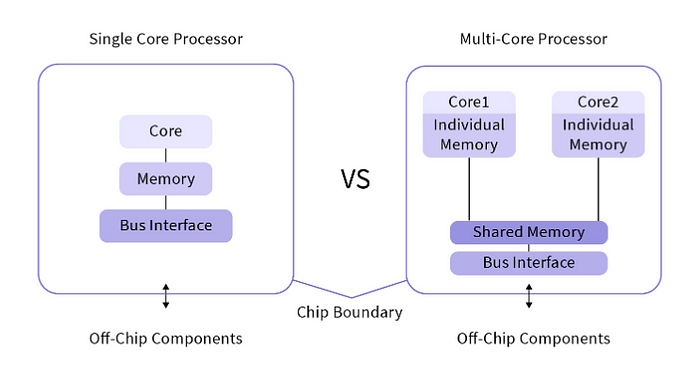Single-Core vs Multi-Core Processor: A Detailed Comparison

In the world of computer processors, the debate between single-core and multi-core processors has been ongoing. Both types have their advantages and disadvantages, and understanding the differences between them can help you make an informed decision when choosing a processor for your needs. In this article, we’ll compare single-core and multi-core processors, exploring their performance, efficiency, and suitability for various tasks.
Introduction
Processors are the brains of computers, responsible for executing instructions and processing data. Single-core processors have one processing unit, while multi-core processors have multiple processing units on a single chip. Let’s delve deeper into these concepts.
What is a Single-Core Processor?
A single-core processor has a single processing unit, meaning it can only execute one set of instructions at a time. While this may seem limiting, single-core processors can still perform well for basic tasks such as web browsing, word processing, and multimedia playback.
What is a Multi-Core Processor?
A multi-core processor contains multiple processing units, or cores, on a single chip. This allows the processor to execute multiple sets of instructions simultaneously, improving overall performance and multitasking capabilities. Multi-core processors are commonly found in modern computers and smartphones.
Performance Comparison
In terms of raw performance, multi-core processors have the edge over single-core processors. The ability to execute multiple tasks simultaneously allows multi-core processors to handle demanding applications such as video editing and gaming with greater efficiency.
Efficiency and Power Consumption
While multi-core processors offer better performance, they can also consume more power than single-core processors, especially when all cores are under heavy load. Single-core processors, on the other hand, are more energy-efficient but may struggle with multitasking and demanding applications.
Suitability for Different Tasks
The choice between a single-core and multi-core processor depends on the intended use. For basic computing tasks, such as web browsing and document editing, a single-core processor may be sufficient. However, for more demanding applications, such as gaming and video editing, a multi-core processor is recommended.
Conclusion
In conclusion, both single-core and multi-core processors have their strengths and weaknesses. Single-core processors are energy-efficient and suitable for basic tasks, while multi-core processors offer better performance and multitasking capabilities. When choosing a processor, consider your computing needs and budget to make the right choice. Xecor offers high-quality processors and solutions to meet your needs.